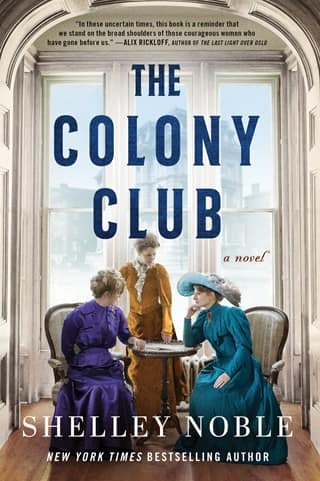Chapter 3
Sunday was supposed to be a day of rest, Nora thought despondently. For Inez and Lucy, it meant church, where they dutifully
carried their prayer books but were really on the lookout for respectable young men with futures. Which Nora thought silly
since they spent Friday and Saturday nights with the boys from the boardinghouse next door, who were fun and spirited and
much too forward for Nora's taste. Not that she was a prude, as she was continually having to remind them. But she had obligations.
So on every Sunday instead of resting, Nora, dressed in her version of Sunday best, made the trip out to Brooklyn to have Sunday dinner with her family, what was left of it.
Tiny flakes of snow greeted her at the sidewalk when she stepped out of the Parker's front door. She sighed, and, tucking
her head against the cold, she walked as fast as she could toward the trolley stop. She climbed in with other shivering passengers
and began the long ride down to the bridge where she would get on another trolley, and then another to Flatbush in Brooklyn,
and eventually make it to her sister's apartment.
The wind across the East River buffeted the car and rattled the tracks as they made their slow way across the bridge. Nora
crossed her arms and hunkered down, wondering if the new underground railroads—if they ever finished them—would be heated.
Now that would be a luxury.
Her teeth were chattering and her feet were numb by the time she climbed off the last trolley. It was snowing in earnest and she slipped and slid all the way down Flatbush Avenue toward Louise and her husband Donner's apartment. Donner worked at the Havemeyer sugar refinery, where he made a large enough salary for Louise to stay at home to take care of their baby.
When Papa died, he made Louise promise to take care of Mama and Rina until Nora finished her architectural training and could
get a job to help. Nora hadn't waited to graduate but immediately started turning over every spare penny she earned from her
tutoring. The effort was just resented by her ever-resentful older sister.
The apartment was on the first floor of a brick building and had its own kitchen and water laid on. Nora brushed the snow
off her shoulders and scarf, straightened up, and knocked on the door.
She heard Donner's deep voice yell for someone to open it.
The door swung open.
"Nora!" Rina exclaimed as if Nora didn't come every Sunday to share a meal, even though her presence just increased Louise's
resentment. But Nora did it for Mama and Rina.
"Shut the door!" Louise ordered, wiping her hands on her apron and not coming closer than the doorway to the kitchen. "Heat
isn't free."
Nora slipped inside, and Rina practically threw herself against the door in her hurry to close it.
Louise immediately disappeared back into the kitchen. Nora said hello to Donner, though his head didn't appear from behind
his copy of the New York Journal . She knew Mama wouldn't come out of her bedroom when Donner was at home, and though Nora longed to go see Mama, it was bound
to bend her sister's nose out of shape if she didn't see Louise first.
She was standing at the stove stirring a big pot of stew, which Nora knew would consist mainly of carrots and potatoes, most of what little meat there was going to Donner. They could easily afford meat. There was no reason to be so stingy. The room was steamy and the window foggy. At least it had a window, something their Lower East Side apartment had lacked.
Resigning herself to being ignored, Nora pulled out her handkerchief, untied it, and let the coins it held drop onto the table.
Louise, with the ears of a fox, turned at the sound.
She took one look at the meager pile, sighed mightily, and came over to scoop the coins into her hand. "Is this all?"
"Yes, some of my tutees didn't return to school after the holidays."
"Holidays," Louise scoffed.
"There will be more next time." At least Nora hoped there would be. Not that it would make any difference to her sister. Sometimes
Nora thought Louise just enjoyed acting miserable.
"There had better be. We have another baby on the way."
Nora glanced at her sister's flat stomach. "Congratulations."
"Another mouth to feed." Louise carried the money over to the cupboard and poured it into an earthenware jar she kept on the
shelf.
"One more semester and I'll graduate. I should be able to get an architectural or drafting job that will pay more. Then things
will get better, I promise."
Louise picked up her spoon. "Promises are what got us in this lousy situation in the first place."
Nora glanced quickly at the doorway. "Shh. Do you want Mama to hear you? She gave us everything she could; now it's our time.
We promised Papa."
"Easy for you to say. You got everything you wanted."
"I didn't want Jimmy to die. Or Papa, either." Nora knew she should just shut up. It was the same argument they always had.
And anything Nora said would just make it worse.
"Can I do something to help?"
"You can set the table."
And that was the last time it was mentioned, though it sat between them, hovering over the stewpot on the table like a black cloud. Everyone concentrated on eating. Mama praised the stew, and Rina would make a face at Nora whenever she was sure Louise wasn't watching.
It was the same every Sunday. Donner would leave the table as soon as his bowl was empty. Mama insisted on doing the washing
up. Louise went off to tend to the baby, and Nora and her sister Rina crept off to the small bedroom Rina shared with their
mother for some quiet conversation.
"I hate her," Rina said as soon as they were sitting on the one narrow bed, hardly large enough for one person, much less
two.
"Hush, it's hard on her. The extra responsibility."
"Pooh, Mama cooks and cleans and takes care of the baby. She dusts and does the mending. If she were getting paid, we could
afford to get our own apartment."
"No, you couldn't. And you wouldn't want Mama going back to cleaning other people's houses, getting chilblains and painful
joints, would you?"
Rina huffed out a sigh. "No. But I could help her."
"Neither one of you is going to do that. You're going to finish school, then we'll look for a good position for you."
Rina flopped back on the bed. "Maybe I'll meet a rich handsome stranger and marry him, then I'll build a big house for all
of us to live in, 'cept not Louise and Donner."
"You just concentrate on your math and forget about rich strangers. How is math going?"
"Okay? It's hard, though. I don't see why you got all the math in your head and I got none at all."
"You have plenty of math in your head. You just need to use it. Let me see your homework."
Rina rolled off the bed, slumped over to where Mama's old sewing machine was wedged in between a dresser and the wall, and returned with a notebook of figures. "Okay, look..." Rina slid closer to her and a few minutes later, Mama came in to see two dark heads deep in study.
She was holding Nora's coat and scarf. "It's snowing hard—you'd better get back to town before it clogs up the tracks."
"But we haven't had any chance for a visit," Nora protested.
"We'll visit next week, now you get going. It's dangerous in the snow."
Nora took her coat. "I'll try to get here earlier next week. If it's nice we can go for a walk."
"Yes," Mama said, putting the scarf over Nora's head and tying it under her chin. Nora gritted her teeth, but she didn't pull
it away.
Mama and Rina walked her to the door. Donner was nowhere to be seen. Nora called out her thank-yous, but, getting no response,
she hugged Mama and Rina and slipped out into the weather.
The snow had turned icy and it stung Nora's cheeks. All thoughts of removing the headscarf fled and she hurried down the street,
eyes focused on the ground so she wouldn't slip and fall.
The trolley was crowded and Nora just managed to find a seat. They rattled across the bridge toward Manhattan, Nora's teeth
chattering with its rhythm.
When they neared the city, she slipped the scarf off her head.
It was dark, but the snow had abated when she wearily climbed the steps to her room. She dreaded coming back here almost as
much as she dreaded going to visit her family. But there was the prospect of a position only a few months on the horizon.
Not just an internship, but as a draftsman or architect with a decent salary. She would make good on her promise. She owed
her family everything and she would realize the trust Papa had placed in her to take care of them.
Maybe when she had a job she could get an apartment. Mama and Rina could come live with her. But she had to find a good job first. And there was the contest...
On Monday just before noon, Daisy took the carriage down to Irving Place.
The day was sunny, but there was still snow in patches on the ground, and she was glad she'd worn her fur coat and muff.
She was suddenly feeling more optimistic. A year ago she'd had the idea of convincing Bessie Marbury and her protégée and
partner, Elsie de Wolfe, to join the club's planning board. She had not been disappointed. They'd both been invaluable members
of the organization's committee.
Bessie had embraced the idea and run with it, as Bessie often did. As one of the most formidable theatrical agents in New
York—perhaps the world—with clients like George Bernard Shaw, Victorien Sardou, and Georges Feydeau, she had clout in places
that Daisy and her set didn't. She knew how to organize, fundraise, and arm-twist with the best of them. And Elsie, with her
dramatic allure and acquaintances in the theater world, added just the right amount of glamour.
When the carriage came to a stop in front of the brick-face corner brownstone a few minutes after noon, Daisy hesitated only
momentarily before stepping down.
If it had been up to her, she would have made a morning call, but Bessie, a thoroughly organized and busy professional woman,
only allowed social calls at noon. Though Daisy suspected this had more to do with long nights at the theater and the amount
of spirits consumed at their Sunday salon, which attracted some of the world's most estimable, and often infamous, artists,
actors, and writers.
She hoped she wasn't imposing on Bessie's time. One didn't like to take advantage of one's friends, and she had already asked
a lot of the industrious Bessie.
Of course, knowing Bessie, she would have just said so outright and saved Daisy a fruitless visit. Though she had to admit no visit with Bessie and Elsie was ever entirely fruitless. Life was always an adventure at "the bachelors' house."
Bessie answered the door herself.
Daisy was momentarily taken aback. Seeing Bessie was always a bit of a shock. A mature women ostensibly in her late forties,
though no one knew for certain? short and heavyset with a face that even the most generous would not call comely, she presented
a formidable figure. Today she was swathed in a chocolate-and-gold brocade tea gown that seemed to magnify her girth. Daisy
often thought that Bessie cultivated her oversized figure as well as her personality as a tool of power.
Elisabeth Marbury had the figure and the personality to wrangle men into doing her bidding.
"My dear Daisy, come in."
"I hope I'm not too early."
"Not at all. Is this about the club, perchance?"
Daisy smiled ruefully. "It does seem that I have a one-track mind, but really the site has been lying razed for months now,
as James Barclay reminded me at the theater this weekend. Our lack of progress appears to be a running joke at various men's
clubs around town. And we still haven't gotten a firm answer from Stanford on whether he will design it."
"Hmmph. James Barclay." Bessie waved the banker and his attitudes away with a flick of her wrist and a jangle of bracelets.
"I shouldn't worry," she said, while the maid took Daisy's coat and muff. She motioned Daisy through the foyer. "But let's
discuss it over a glass of sherry. You don't mind, do you? If I had my way, tea would be banned from morning and afternoon
calls altogether. If Anne Morgan is to have her track, and Emmie Winthrop her tennis courts and a swimming pool, I must insist
on having a full working bar."
Daisy laughed. "I don't think you'll find too much objection to that. If we're discreet. We do have a couple of members who belong to the Temperance League."
"The more fools they."
She led Daisy past the dining room, and Daisy paused as she always did just to peek inside. The once-dark wallpaper and ponderous
dining furniture had been transformed by Elsie into a bright uncluttered space, furnished with white table and chairs, green-and-white
surrounds, and a white ceiling that created an invitation to enjoy.
"I never pass this room without thinking I'm walking into a garden," Daisy said. "If I can ever get Bordie to give up his
dark wainscoting and morose leather chairs, I will definitely consult Elsie."
"She has transformed the whole place into a display of light and color," Bessie said as they continued across the hall to
the parlor. "No more stodgy, overcrowded Victorian rooms for us."
"How does she find the time?"
"Oh, she loves it. She's always had an impeccable sense of color and proportion. And she loves poking about antique shops
and markets to find just the thing she thinks will be perfect for some space or other, not caring a whit if it's authentic
or a copy. I don't see it, but I'm happy that she's found something relaxing away from the demands of the theater. I sometimes
wonder...
"But do have a seat, Daisy. Elsie is around here somewhere." She sat ponderously in her "visiting" chair, which her friends
called the Throne, for its heavily carved and ornate Baroque construction, and rang for refreshments.
Daisy sat on a parlor chair opposite Bessie and next to a gold Moroccan-print chaise longue.
"Have the ladies changed their minds again?" Bessie asked. "I've been so busy these last few weeks I've hardly spoken to a
soul outside of the theater business."
"Oh, no. They want Stanford White. It's just about the only thing they all agree on. But he still hasn't signed. I know he's busy, but the club needs his artistry and his reputation if we are to be taken seriously in this endeavor."
"And you shall have him," Bessie said. "So worry no more about that."
A moment later, Elsie, wearing a flowing yellow tea gown of the latest Paris fashion, wafted into the room, accompanied by
her two French bulldogs, Faustina and Fauvette, who were in turn followed by a maid carrying a decanter of sherry and plates
of sandwiches and sweets.
"Daisy," Elsie crooned. "Bessie said you were coming. It's been ages." She glided over to take Daisy's fingertips in hers,
then wafted over to the chaise longue, where she stretched gracefully into a pose—a cloud of floating meringue next to Bessie's
bread pudding.
"Now, Daisy," Bessie said, as soon as the sherry was poured and the plates passed. "Tell us what else is on the agenda."
"First and foremost, we need to get Stanford's signature. I want to break ground on the clubhouse before everyone leaves for
the Continent, after which it will be impossible to get anything toward a permanent clubhouse decided. We can't just keep
moving our meetings, lectures, and concerts from one place to another like a group of vagabonds. The lecture on Renaissance
tapestries at Sarah Hewitt's ballroom was so crowded I was afraid people might start succumbing to the lack of air. Several
ladies mentioned it and asked when I thought we would be in our new home.
"The membership has grown so quickly that it's hard to keep up with accommodating them all. I'm thinking about hiring an assembly room for the duration. There's one only two doors down from the construction site that would be convenient for keeping an eye on things... when we finally have something to keep an eye on."
"Ah," Bessie said. "An excellent idea."
"I'll bring it up at the next board meeting. I doubt if we'll have any arguments on that."
Bessie laughed. "With this group of ladies? Lord, they can argue over whether grass is green and the sky is blue."
Daisy sighed. "I try to think of it as active minds at work. And they're all depending on me to steer us through these preparatory
days. But I can't do that until we have an architect."
"Well, never mind," said Bessie. "Perhaps it slipped his mind. He's already quite busy between the Grand Central competition,
the Madison Square church, and the Payne Whitney mansion, new digs for the newlyweds. They say Helen is impatient to take
up residence."
"And so are we," said Daisy. "Helen doesn't have to deal with forty women all with their own ideals in mind. She'll tell him
exactly what she wants and he'll run off to Europe on a buying trip and heaven knows when we'll see him again.
"We need an answer. And we need him to get started. Even without his other obligations, it will take at least a year for him
to draw the plans and hire the crews and begin construction, another year to complete the exterior, interiors, and furnishings.
That will be the end of 1906 if all goes to schedule."
"And it will, Daisy," Bessie said and drained her second glass of sherry. "We shall have the most prominent club in the city
with a running track, a tennis court, a pool, and a bar. Alva will even get a place to debate women's suffrage. You just leave
Stanny to me."
"Thank you," Daisy said, feeling slightly more optimistic.
"Not at all. Another glass of sherry?"
Daisy left a half hour later much reassured and feeling a warm glow from the sherry. She had every reason to think they would soon have Stanford White signed on to the club. No one ever held out against Bessie for long.
"Daisy seems nervous," Elsie said as Bessie returned from seeing Daisy off. "Is there a problem with Stanny?" Elsie poured
herself another glass of sherry and inspected the sandwiches, looking for one that didn't contain meat.
"No more than the usual," Bessie said. "But he's not a young thing anymore. I'm afraid his lifestyle is catching up to him.
But he'll sign. He can't afford not to."
Elsie turned, a crustless egg-and-tomato triangle held daintily in her fingers. "Because the rumors are true? He's close to
broke?"
Bessie barked out a laugh. "Lord, Stanny has been close to broke for... I don't know how long. It's his health in combination
with the pressures of staying one step ahead of his creditors and his clients that worries me. He has to take every commission
he can, especially ones that pay well, and the Colony Club is able to do just that. Though perhaps I'll give him a little
nudge. We'll all be leaving town soon."
Elsie sighed and slumped back on the chaise, managing not to spill her sandwich or her sherry. "Everyone but me."
"Never you mind. A successful play is vastly more important than a few extra weeks in Versailles."
Elsie took a bite of the sandwich. Sometimes she wondered if Bessie was just humoring her. Elsie didn't need cosseting. She
needed success. Only last year she'd been the star of a Frohman play, Cynthia , only to fall into a supporting role in a mediocre play that had been written as a vehicle for Lionel Barrymore and where
she had to share what was left over with her sister-in-law, of all people.
This wasn't acceptable. She stood and walked over to the fireplace; took a Ming porcelain dog from the mantel. "I was wrong.
I don't like the way this looks after all."
 Fullepub
Fullepub 



